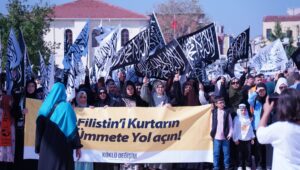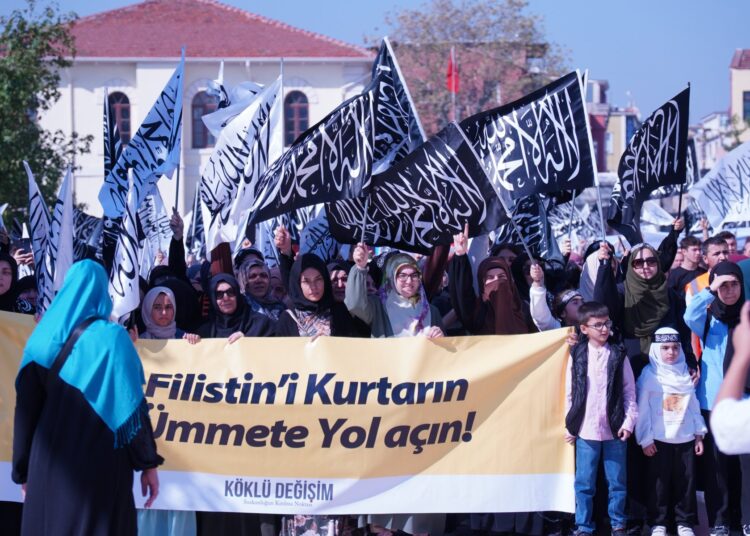Abdullah Bozkurt/Stockholm
Hizb ut-Tahrir, an outlawed group that operates freely in Turkey under the Islamist government of President Recep Tayyip Erdogan, has called for an armed campaign against Israel to eliminate the Jewish state amid an ongoing offensive in Gaza by the Israeli military in response to Hamas terrorist attacks in Israel on October 7.
“If you want to take action, here’s the opportunity. Turkey should not enter Gaza as a peacekeeping force but as an attacking force against the occupier, ‘Israel’,” Mahmut Kar, the leader of Hizb ut-Tahrir’s Turkish network, tweeted on October 22, adding, “Gaza is waiting for you.”
In dozens of rallies held across Turkey, including those in front of the Israeli consulate in Istanbul and the US embassy in Ankara, the group announced that Muslim countries should mobilize their armies instead of relying on protests and demonstrations. The group also advocated the idea of sending fighters to Israel if Turkey fails to take action, and they called on the government to facilitate such a deployment.
During the demonstration held in front of the US embassy on October 30, the group burned an American flag, chanted “Murderer Israel, murderer US” and called for the expelling of all US diplomats in Turkey. They also shouted slogans advocating the establishment of a caliphate, the implementation of Islamic sharia law and the deployment of the Turkish army to Gaza.
The group publicly endorsed Hamas’s terrorist attacks, praising its militants as mujahedeen fighting against the occupying power, and called for Turkey to support Hamas’s military wing, the Izz al-Din al-Qassam Brigades.
Hizb ut-Tahrir, a radical group that opposes democracy and advocates the re-establishment of the caliphate, is known for its virulent antisemitism and its calls to eliminate Israel. The group has played a significant role in organizing anti-Israel demonstrations in Turkey, where leaders of Muslim countries are criticized for not taking stronger action against Israel and for not supporting Palestine.
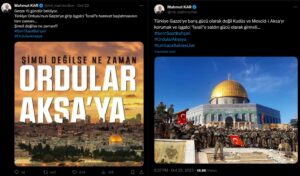
In these demonstrations, they have referred to the Western world as “infidels” who need to be confronted and called Israel “Jewish dirtbags.”
The group blames the Republic of Turkey, the successor of the Ottoman Empire, for the abolition of the caliphate in 1924, claiming it to be the source of all problems in the Muslim world, including those in Palestine. They have seized the recent Israel-Hamas conflict as an opportunity to promote their decades-long advocacy for the re-establishment of the caliphate.
Hizb ut-Tahrir openly opposes secular democratic governance in Turkey and rejects participation in political processes. It has demonstrated itself to be a significant threat to public security. In one instance, a Turkish man who had been radicalized by Hizb ut-Tahrir was discovered to have joined the Islamic State in Iraq and Syria (ISIS), reinforcing concerns that the group may serve as a conduit for radical jihadist groups.
Despite being banned and designated as a terrorist group in in Turkey, Hizb ut-Tahrir experienced a resurgence under the government of President Erdogan, facilitated by the group’s support for Erdogan’s ruling Justice and Development Party (AKP), which has its roots in political Islam. As a result, Hizb ut-Tahrir was allowed to organize significant events in Ankara and Istanbul, where the group’s global operatives openly promoted the idea of establishing a new caliphate.
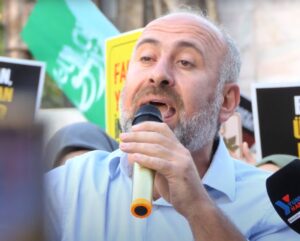
The group operates through a media and publishing firm named Köklü Değişim Medya Basın Yayın Organizasyon Ticaret Limited Şirketi, which was founded on December 1, 2016 in Ankara. Trade registry data indicate that this for-profit company was established by Kar, who was listed as the founder and the sole authority to represent and conduct operations for the firm.
The company’s charter was quite extensive, allowing it to engage in various activities both within Turkey and abroad. The founding capital was declared to be 20,000 Turkish lira (equivalent to $5,714 at the time), which appears to have been a symbolic amount.
The company established branches in Istanbul and various other Turkish provinces. It has been involved in publishing books and magazines and has actively utilized social media and video-sharing platforms to promote its vision of a caliphate.
Hizb ut-Tahrir has been active in Turkey since the late 1960s, and members of the group have faced prosecution at various times as successive Turkish governments have enacted a series of public security measures, including utilization of the criminal justice system, to prevent the radical group from developing into a significant national security threat.
The outlawed group was designated as a terrorist organization by the Supreme Court of Appeals’ 9th Chamber on September 26, 2004 under Article 314 of the counterterrorism law, which pertains to armed terrorist groups. The appeals court also upheld another court judgment on November 29, 2007 reaffirming the existing precedent regarding Hizb ut-Tahrir.
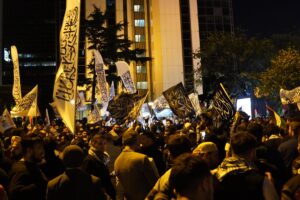
The last time the Supreme Court of Appeals ruled to continue designating Hizb ut-Tahrir as a terrorist group was on October 4, 2017, when it upheld its previous judgments.
Despite a series of similar rulings spanning decades, the Constitutional Court, under the directives of the Erdogan government, made a ruling on July 19, 2018 stating that Hizb ut-Tahrir could not be considered a terrorist organization. The court exceeded its mandate and conducted a substantive examination of the case, completely reversing the judgments of the Supreme Court of Appeals as if it were a criminal appeals court.
The inconsistencies in rulings issued by the top courts in Turkey have significantly benefited Hizb ut-Tahrir members who were facing prosecution and indictment. Many were acquitted based on the Constitutional Court ruling, while a few courts in Turkey continued to treat the group as a terrorist entity based on the Supreme Court of Appeals’ decisions.
The Hizb ut-Tahrir global organization designated Turkey as one of its provinces in 1997 and established a covert structure that spans local neighborhood organizations at the grassroots level to a senior leadership governed by provincial authorities. The group operates within a hierarchical framework, holding regular meetings and reporting their activities to the leadership committee. Additionally, it receives foreign funding.
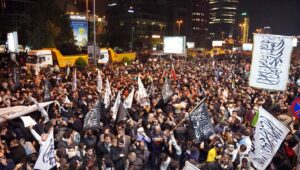
In June 2011 prosecutors ordered police to launch an operation against Hizb ut-Tahrir cells in five cities, detaining 17 people. Turkish investigators discovered that the group was regularly funded by Imameddin A.A. Barakat, a Jordanian citizen of Palestinian origin who resides in Israel. The bookkeeping records of Hizb ut-Tahrir members that were seized during the operation revealed that a businessman acting as a courier named Mazin Harbawi entered Turkey with bags of money every two months and gave the money to V. A., the member in charge of Hizb ut-Tahrir’s İstanbul operations. Investigators believe Harbawi smuggled in about $40,000 during each visit.
A report issued by the Security General Directorate on February 24, 2017 reveals how Hizb ut-Tahrir operates as a secret leadership committee that comprises three to 10 people and reports to a presidential council.
The group has not been involved in any violent incident since it faced a crackdown in 1967, but a police operation that was conducted against Hizb ut-Tahrir cells in 2009 found one long-barreled gun, two handguns, five rifles and six blank-firing pistols. Police said the group was planning to stage a large attack in İstanbul on the anniversary of the abolishment of the caliphate. The Ottoman Caliphate was abolished by Mustafa Kemal Atatürk on March 3, 1924, following the founding of the secular state. The investigators’ assessment at the time was that the group would resort to violence to promote its views whenever it finds fertile ground to do so.
Wiretap records from 2008 showed that Hizb ut-Tahrir members were talking among themselves about jihad and making a trip to Palestine to join the jihadist cause. The probe also uncovered how some members of Hizb ut-Tahrir had links to a neo-nationalist group in the Turkish military and intelligence agency. Both were aiming to sow chaos in Turkey in order to promote their parochial interests.
